

What Streaming Music Services Pay. Some artists say they’re not earning enough from music streaming.
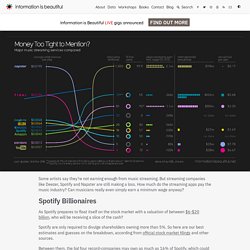
But streaming companies like Deezer, Spotify and Napster are still making a loss. How much do the streaming apps pay the music industry? Can musicians really even simply earn a minimum wage anyway? As Spotify prepares to float itself on the stock market with a valuation of between $6-$20 billion, who will be receiving a slice of the cash? Spotify are only required to divulge shareholders owning more than 5%. Between them, the big four record-companies may own as much as 16% of Spotify, which could mean a windfall payout of up to $650 million. Related: How $1 Flows From Spotify to Recording Artists, from the New York Times. Which they will no doubt immediately share with all the musicians and artists who have made Spotify such a desirable platform, right? Spotify Stands Tall in Mexico. More than 60% of streaming music users in Mexico are tuning in to Spotify, data from The Competitive Intelligence Unit shows.
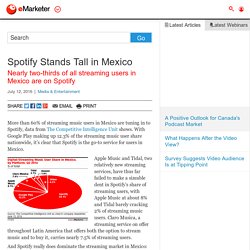
With Google Play making up 12.3% of the streaming music user share nationwide, it’s clear that Spotify is the go-to service for users in Mexico. Apple Music and Tidal, two relatively new streaming services, have thus far failed to make a sizeable dent in Spotify’s share of streaming users, with Apple Music at about 8% and Tidal barely cracking 2% of streaming music users. Claro Musica, a streaming service on offer throughout Latin America that offers both the option to stream music and to buy it, carries nearly 7.5% of streaming users. And Spotify really does dominate the streaming market in Mexico: Over 25% of internet users surveyed by GlobalWebIndex survey in 2015 said they were Spotify users, the second highest figure in the world, behind Sweden.
And regionwide, Mexico trails, too: Audio Ad and Oh! Previous Article. Paid music streaming services thrive in Korea. By Yoon Sung-won Korea has increasingly embraced paid streaming services as the main source of music content compared to other countries, according to the International Federation of Phonographic Industry (IFPI), Wednesday.
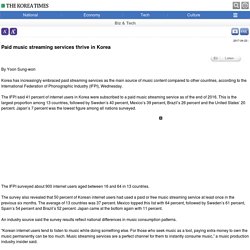
The IFPI said 41 percent of internet users in Korea were subscribed to a paid music streaming service as of the end of 2016. This is the largest proportion among 13 countries, followed by Sweden’s 40 percent, Mexico’s 39 percent, Brazil’s 26 percent and the United States’ 20 percent. Japan’s 7 percent was the lowest figure among all nations surveyed.
The IFPI surveyed about 900 internet users aged between 16 and 64 in 13 countries. ASCAP, SACEM and PRS for Music launch joint blockchain project. Music collecting societies ASCAP, SACEM and PRS for Music are teaming up for an ambitious partnership based on blockchain technology.

The societies said the project will “prototype a new shared system of managing authoritative music copyright information using blockchain technology”. That will include a new system for matching music recordings with song compositions – via ISRCs and ISWCs respectively in terms of codes – in an effort to solve the music-streaming world’s headaches matching label and publishing data.
This isn’t just a three-way project. The societies have also brought IBM on board. Major Lazer Tease Four Songs Set for Release This Summer, Announce 'Tuborg OPEN' Collaboration: Exclusive. Dance supergroup Major Lazer have helped catapult eclectic world sounds to mainstream music’s forefront, and now they’re leveraging their tastemaker abilities for their latest collaboration.
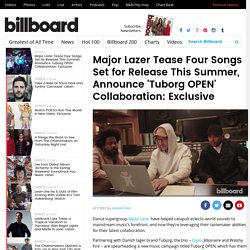
Partnering with Danish lager brand Tuborg, the trio -- Diplo, Jillionaire and Walshy Fire -- are spearheading a new music campaign titled Tuborg OPEN, which has them joining forces with three artists from around the world to fuse their native styles with Major Lazer's signature island vibe. After the hitmaking triad creates a standard beat open enough for interpretation, the chosen international artists have the opportunity to augment the original track and showcase the sounds and styles that best reflect their individual hometowns, resulting in culturally diverse tracks.
Scriptonite, Russia's most highly praised hip-hop star, originally from Kazakhstan, is the first of the three chosen collaborative artists, with the remaining two set to be revealed in May. How many you might be asking? ASCAP, PRS and SACEM join forces for blockchain copyright system. Three of the world’s most established collection societies – ASCAP (US); SACEM (FR) and PRS For Music (UK) – are working together to improve the future of music copyright management.

The triumvirate are jointly building a blockchain-based system which aims to manage the links between music recordings International Standard Recording Codes (ISRCs) and music work International Standard Work Codes (ISWCs) According to a press release: ‘Establishing robust links between these two pieces of data offers a practical solution with enormous potential for improving the processes of royalty matching, which will in turn speed up licensing, reduce errors and reduce costs. The goal of the project is to prototype how the music industry could create and adopt a shared, decentralized database of musical work metadata with real-time update and tracking capabilities.’
Jean-Noël Tronc, SACEM’s Chief Executive Officer (pictured), said: “We are very excited about this joint initiative. Does the Music Industry Need a Blockchain? – Paperchain. As awareness moves beyond BitCoin and cryptocurrencies to distributed ledgers, blockchain is fast-becoming the dominant (theoretical) solution to challenges facing many industries.
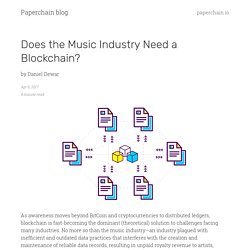
No more so than the music industry—an industry plagued with inefficient and outdated data practices that interferes with the creation and maintenance of reliable data records, resulting in unpaid royalty revenue to artists, publishers and labels. For an industry so reliant on digital means, its infrastructure suggests that an old-school mentality framed digital development—and so we’re left with a fragmented and dysfunctional data infrastructure. The power of the playlist: how streaming is changing the way we listen to music. It's 20 years since arguably the most important LP of, well, the last 20 years.
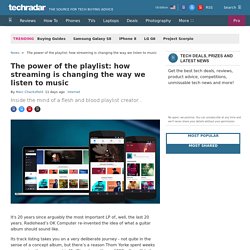
Radiohead’s OK Computer re-invented the idea of what a guitar album should sound like. Its track listing takes you on a very deliberate journey - not quite in the sense of a concept album, but there’s a reason Thom Yorke spent weeks rearranging the songs on his MiniDisc player (it was 1997, after all) before deciding on the right order: it’s an album that demands to be listened to from beginning to end. 20 years on and the idea of an album is being questioned once again by Drake. His latest LP is part mixtape, part album and, much more significantly, a playlist.
More Life is Drake bringing together a selection of songs that “become the soundtrack to your life,” according to an interview with Complex. Justin Bieber concert: India’s live music scene faces multiple challenges. New Delhi: In what may easily be described as a treat for pop music fans in India, Canadian singer-and-songwriter Justin Bieber will perform in the country this May.
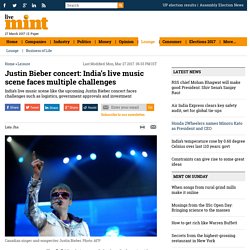
Organized by event production and management company White Fox India, the Grammy Award winner will bring his Purpose World Tour to the D.Y. Patil Stadium in Navi Mumbai apart from visiting Israel and Dubai as part of the Asia leg. Bieber is the third recent international artiste to have cashed in on the massive fan following he commands in India after British rock band Coldplay which had flown down in November and French songwriter David Guetta who came in January. However, in a country still trying to discover entertainment options other than cinema, challenges for the live music scene persist. And while investment in individual shows can vary from Rs10 lakh-Rs 3 crore and about Rs20-30 crore in case of top international artistes, the challenges range from logistics to required government approvals to investment.